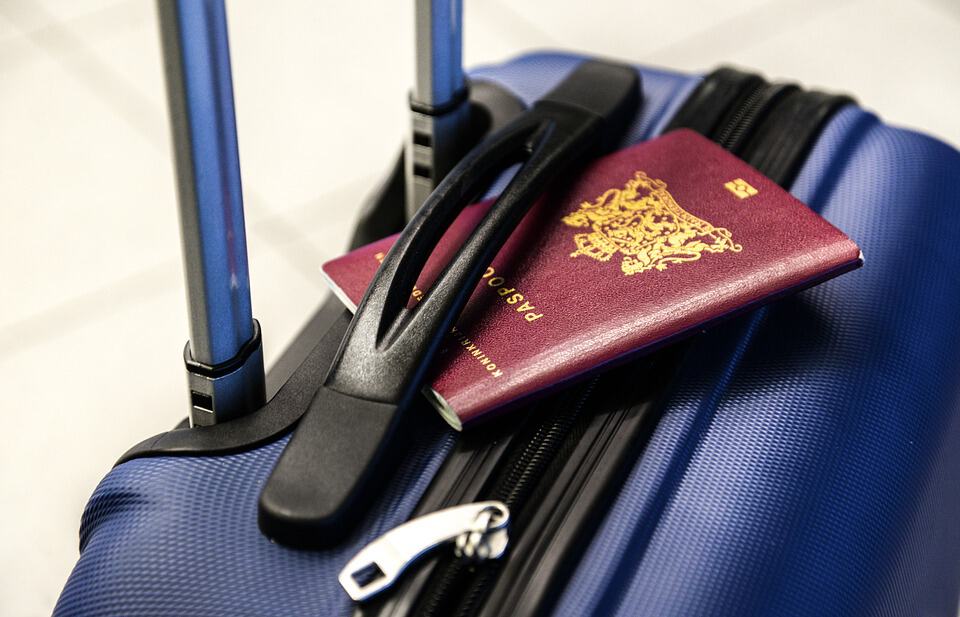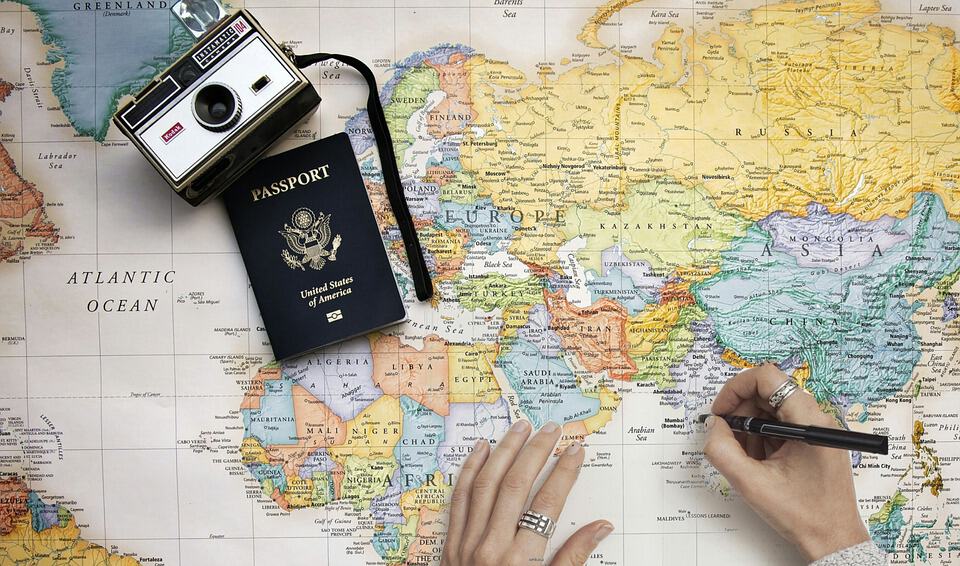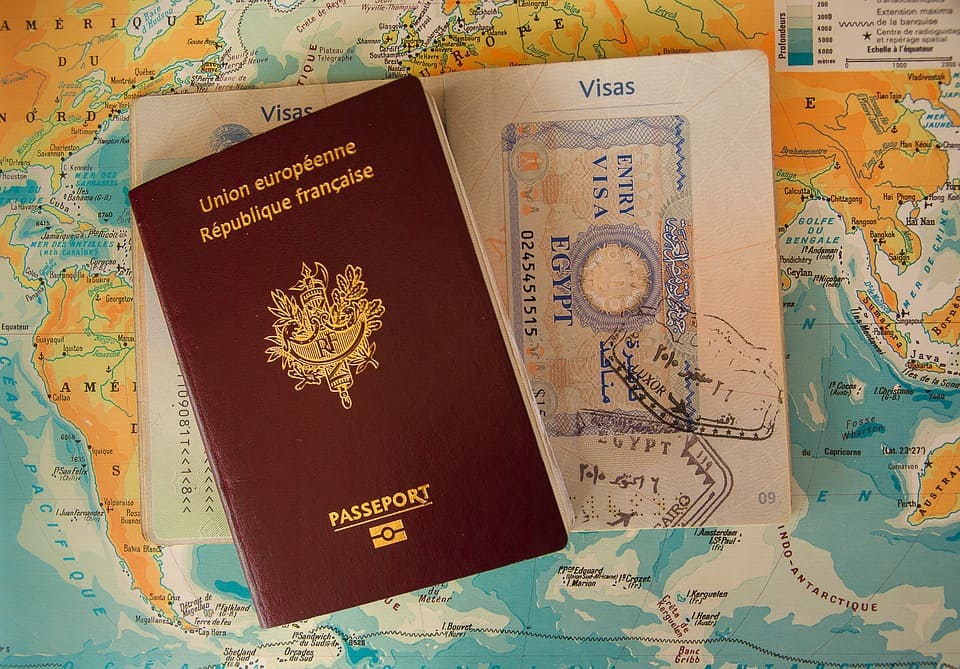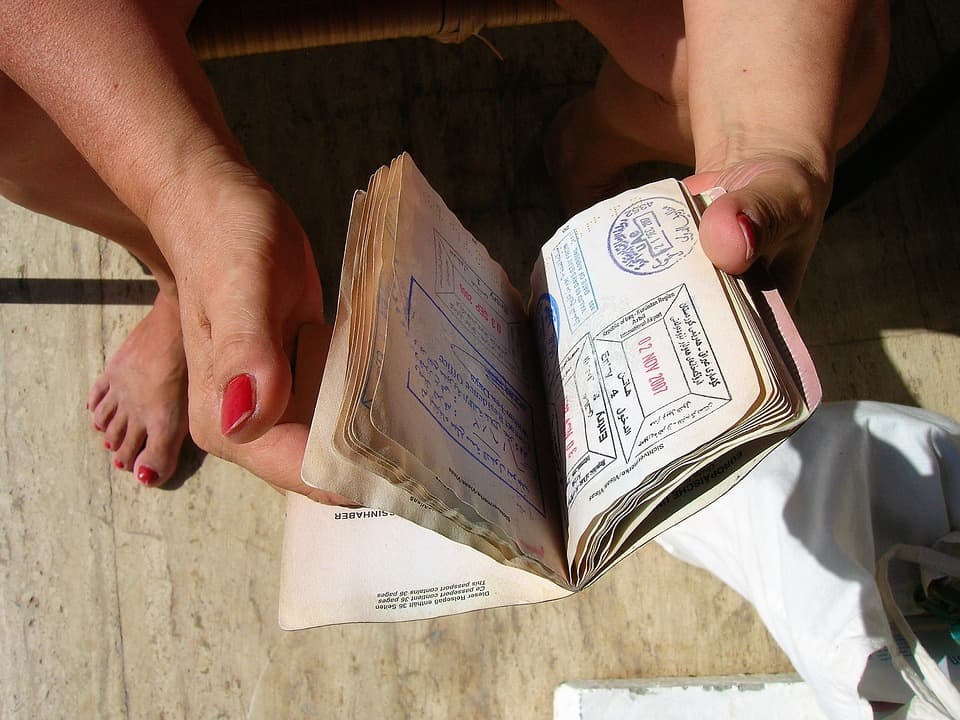Passports and visas are two key aspects of digital nomad existence and they seem to be the cause of the majority of problems that digital nomads face on the road too. So, we thought we’d put a brief guide to passports and visas together that might help you avoid the, often nightmare, issues that getting things wrong can bring.
Table of Contents
About Passports

Passports are essential for international travel. Now, it can be argued that, for example, an EU citizen can go anywhere in the EU without a passport as long as they have ID. This is true.
But let’s acknowledge upfront that the vast majority of international journeys need a passport if you want to get on the plane/boat/train/zeppelin/etc.
Passports are a fairly basic document that are issued by the government of the country (or a country) that you are a citizen of. They verify your identity and nationality and a few other basic details (date of birth, your photo, that sort of thing) to the country or countries you wish to visit.
Nearly all passports now contain a biometric chip which makes your passport both machine-readable and much harder to forge. This is good news because it means that it’s no longer worth anyone’s effort to try and steal your passport.
Passports contain a number of blank pages – these pages are to house visas. You may or may not need a visa to visit any given country. If you do need one when you obtain it, it will be stuck in your passport (in some form or another – some country’s e-visas you’ll print yourself and staple into your passport).
Some Things Every Digital Nomad Should Know About Passports But Many Don’t
These are the important things you need to know about passports:
- Your passport must be valid for your date of travel
- Importantly: Most (though not all) countries require that you have at least 6 months of future validity on your passport before they allow you to enter – so if you want to go somewhere on 1st of January, 2025 – your passport must expire after the 1st of July, 2025 or you will probably be refused entry to the country or refused access to your flight
- Your passport should not be ripped or torn or damaged in any way
- Yes, they will refuse boarding or entry for this. A friend of mine was nearly refused access to Poland for a tiny tear on the details page of his passport.
- You may need 2 (or more) consecutive blank pages in your passport
- This is a bit more random, but many countries require a specific number of consecutive blank pages in a passport to admit you. The UK is like this and a South African lady and her whole family were deported from Heathrow for failing to meet these criteria. That’s a very long, expensive flight for a fairly minor error.
- You must not, under any circumstances, remove old visas to make space in your passport
- This can get you into serious trouble, particularly, if trying to enter the country whose visa you ripped out of your passport – if you’re running out of space you need to buy a new passport (and yes, this is expensive and inconvenient but it’s still better than being jailed in Cambodia)
- If you have two passports from two different countries, you must enter and leave a country on the same passport
- You may also be legally required to use one passport or the other, particularly, when visiting an issuing country
- You will only be entitled to help from the consulate or embassy of the passport that you used to enter the country on – this may be very important
- You may be able to buy a bigger passport from your passport issuing authority
- The UK, for example, offers a 32 page and a 48-page passport, if you’re serious about being a digital nomad – buy the big one. I’ve gone through 5 passports in 20 years (it would have been more, but Saudi Arabia always stamps the same page over and over again), you can never have too many blank pages in a passport.
- The USA used to extend passports for additional pages. They don’t do this anymore.
- Using a passport holder is a bad idea
- These would be a great idea if it wasn’t for the fact that a ton of places make you remove the passport from the holder before they scan it, etc. You’re better off keeping your passport in a hand carry bag.
- It is theoretically illegal for someone to take your passport away from you unless you are under arrest
- In reality, hotels often want a passport as a security deposit and some countries may expect contract workers to surrender their passports to the company that they work for
- You should always carry a photocopy of your passport ID page and a photocopy of your visa page
- There are places on earth, like Thailand, where it is a crime not to carry your national ID. Mostly, these places will accept a photocopy. Plus, a photocopy makes your life easier if you do do something stupid and lose your passport.
- Always carry a boatload of passport photos too
- Living life on the road is an endless procession of paperwork for travel which almost always requires a photograph. Do yourself a favor and get 40 done at a time. It’ll save running around some town you don’t know and don’t speak the language in, desperately hunting for a photo before the embassy closes
Here’s a handy hint too: always take a photograph of your visa page and ID page of your passport when you land in a new country using your smartphone. This will make life a lot easier if you lose it or it is stolen.
Renewing Your Passport Overseas

The exact process for renewing your passport overseas varies not just depending on which country you are in but also which country your passport is from.
It is best to Google for your local embassy and/or consulate and use their guidelines. Don’t ask in Facebook groups about these things – the advice is often completely wrong or massively out of date.
An example of this in action:
Megan is a Filipino. She has a 5-year passport and will need to renew in early 2020.
She will need to do this in Cambodia (in Indochina) or go home to the Philippines.
Why? Because everywhere else requires a national ID card, which she doesn’t have, to get her passport renewed.
The renewal process takes up to 60 days outside of the Philippines! In the Philippines, it can be done in a week.
Nick is English. In Thailand, he can renew his passport in person in Bangkok or Chiang Mai.
Elsewhere in the region, he needs to DHL his passport back to the UK, along with payment, etc. and then wait for it to arrive via DHL in return. When he collects his passport, it won’t come to his house – it will go whichever random processing center, in whatever city the UK decides he needs to go to.
The whole process takes about 30 days. However, occasionally this process breaks down – he was once stuck without a passport in Cambodia for 6 months (thank goodness, he had a 1-year visa).
Because passport renewal is a pain in the bum – digital nomads are advised to think ahead and try and time their passport renewal with entry into a country on a 3 month (or longer) visa. Don’t assume that a month will be enough time.
What To Do If You Lose Your Passport?

Don’t lose your passport. Useless advice, I know. But replacing a passport is a real pain. A real pain. Think of your passport as digital nomad gold.
So, if you can avoid it – don’t lose your passport. Photocopy it when you arrive. Keep the real thing at home under lock and key (hotel safe, a box under the bed, etc.). And then try not to forget it when you leave.
Report It: Three Times!
If you do lose your passport – then you need to start by reporting it stolen. Hopefully, you have that photocopy handy or the copy you took with your mobile phone. The first place to go is to the police station – you need to report it stolen and give us as much information as possible about it.
If you’re incredibly lucky they’ve found it and you get it back at this point. We’d put the odds of this happening at about 1 million to 1. If not, get that lovely police report and go make some copies of it – you’re going to need them.
Next stop is your embassy. If there’s no embassy in the city you’re in? Tough. Time to get on a plane, bus or train and get to your embassy (or in some cases the embassy of another country which has agreed to take on services for your country – this is the worst possible time to have lost your passport). Google to find out where to go.
Once they’ve told you what comes next (they may be able to issue a new passport there or help you send off for a new one, at least or they may issue you an emergency travel document and you’ll have to go home to get a new one) then you also have another stop.
Finally, you need to visit immigration (got that visa photocopy or photo, handy? Good, this will stop you from getting arrested) and explain the whole thing to them and find out what you need to do when your passport comes back. (It is possible they will fine you for overstaying a visa even if it’s not your fault at this point).
It can take weeks or even months to process all the crap associated with lost/stolen passports. So, try to avoid losing it in the first place, OK?
About Visas

We talk about this at length elsewhere but there’s no such thing as a digital nomad visa. Which means you need to understand visas a little before you travel.
A visa is a piece of paper that says you have been approved by an external authority to enter another country. Not every country requires a visa (they may offer freedom of movement, as with EU citizens in the EU, or visa exemption such as Thailand offers many nationalities on arrival) but if they do require one, they won’t let you in without it.
It’s also worth noting that possession of a visa does not guarantee entry to a country. The immigration officer at your port of arrival has the final say on whether they let you in or not. It is rare for an immigration officer to deny entry if you do have a visa, however.
It’s worth noting that an immigration officer may be able to ban you from ever entering a country but if they don’t – you can always take your visa and try a different officer, we have come across many people who got told “no” somewhere and then they came back two hours later and were waved through.
The most common visa type that digital nomads use is a tourist visa. This is a visa which is usually easy and cheap to get which allows entry to a country for the purposes of tourism. It absolutely does not confer any right to work.
Ignore what other digital nomads try and tell you – there’s no “grey area” when it comes to visas. Working on a tourist visa is illegal. Nobody will ever notice you do it, mind you.
Incredibly, there has only been one immigration raid on co-working spaces in South East Asia. It took place in Chiang Mai and ended with confused police releasing everyone they’d arrested because they couldn’t decide whether digital nomads were a good thing or not. True story.
This doesn’t mean that raids won’t take place in the future (easy pickings for immigration officers looking to make a target, right?) just that they are not common now. We don’t recommend working in co-working spaces anyway.
However, for the moment working at home, in a café or a co-working space is an ultra-low-risk activity for the digital nomad even one with only a tourist visa to show for themselves.
There are numerous other categories of visa including business, work, research, journalism, NGO, volunteer, diplomatic, etc. and they all come with their own privileges and restrictions. Google for your options before you buy your visa, some of them are surprisingly good.
Things You Need To Know About Visas As A Digital Nomad

Visas are quite straightforward, most of the time, but here’s what you need to know:
- Always check your details are correct on the visa before you travel
- Yes, even though you already have a visa, you can be refused entry if your visa details don’t match your passport details
- There may be an enter after or enter before date on the visa
- If you don’t enter the country after/before the date – you’re going to be refused entry
- There may be a requirement to leave the country every x days or report to an authority every x days
- Not common on tourist visas but business visas, education visas and the like often require some sort of action every 30-90 days
- The most common digital nomad instance of this will be with the Thai Multiple-Entry tourist visa which requires you to leave the country after 60 days
- The numbers of days you can stay usually begin on the day you enter the country
- So, enter at 11:59 p.m. and you just lost a day of visa
- There are exceptions to this rule, China, for example, starts the day count the day after you enter China
- Your visa may require you to report to an authority on arrival in the country (often but not always the police) if you stay in a hotel this may be done for you, but it hardly ever is if you’re staying in an Airbnb – find out before you travel and make sure this is done.
- Most visas are single-entry (that means if you leave the country that the visa was issued for, the visa is canceled even if you only used it for an hour) but some may offer multiple-entry (where you can leave and come back a set number of times or an unlimited number of times before the visa expires)
- You can get into serious trouble if you do not have a valid visa or if your visa expires before you leave the country
- If you change your passport – you may need to have the visa moved to the new passport
- This is not true for every country, but it is true for some, find out because the process is often an enormous pain in the bum and may not be done at the airport as you leave
Conclusion

You can’t be an international digital nomad without a passport. There are some fairly stupid rules surrounding passports that they don’t teach us in school. Losing a passport is a really bad idea.
Visas are not always needed but if you do need one, get one. A visa does not guarantee entry to a country, but it does help. There are some funny rules around visas too.
Let me repeat that Google is your friend when it comes to visas. It is a much more reliable source of information than digital nomad groups – visa regulations can change daily; find the embassy of the country you want to visit and contact them to find out what’s what.
